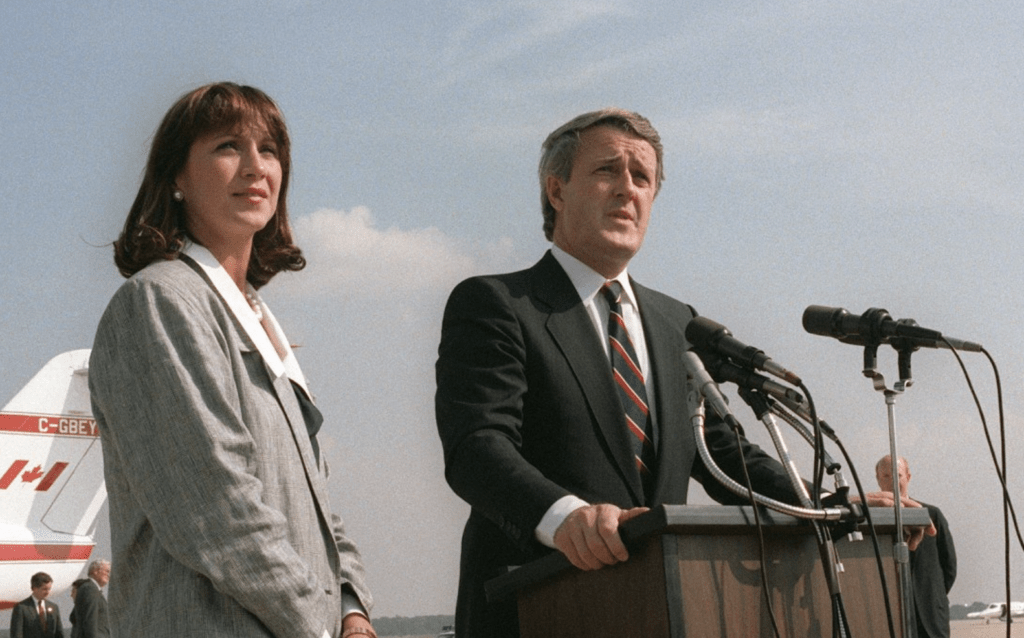A Mulroney Lesson for the Tories: Amazing what Electability Can do for Party Unity
 Wikipedia
Wikipedia
Lisa Van Dusen
February 2, 2022
Among the most pertinent lessons today’s federal Conservative Party can absorb from the tenure of Brian Mulroney as Progressive Conservative leader and prime minister is this: You’d be amazed at what electability can do for party unity.
This lesson is far simpler in theory than it is in practice, especially for the Conservatives. Electability for a Conservative leader these days is determined less by inherent popularity than by ideological obstacle course — a reality so endemic to the party that it has defined the post-Progressive Conservative trajectory of the organization and every leadership contest since Stephen Harper’s departure in 2015.
There are three elements to the relationship between unity and electability. The first, in a pre-election context, is party unity. Party unity for Mulroney, the PCs’ first leader of what would be the post-Pierre Trudeau era, began from a much higher threshold than it otherwise would have had he not been a fluently bilingual, high-profile labour lawyer and international businessman with a Kennedy-esque family holiday card. Mulroney’s baseline, broad appeal coupled with his particular appeal in Quebec gave him a level of electability that, in turn, provided a degree of authority that made party unity less of a challenge than it would have been otherwise.
In a post-election governing context, the second element of the relationship between unity and electability becomes the first element: caucus unity, which always, somewhat unfairly, evokes drunken cat-herding. Mulroney prioritized caucus relations in a way that placed MPs not so much on a par with his frequently cited leadership priorities of Canada-US relations and fed-prov, but on a level that was separate but equal. My late father, Tom — himself a former reporter who’d worked for Conservative prime minister John Diefenbaker and Liberal ministers Allan MacEachan and Mitchell Sharp and who was liked and respected by all parties — was Mulroney’s caucus liaison.
Mulroney prioritized caucus relations in a way that placed MPs not so much on a par with his frequently cited leadership priorities of Canada-US relations and fed-prov, but on a level that was separate but equal.
The importance of the role to Mulroney was underscored and telegraphed to caucus by my father’s appointment, by the earshot proximity of his office to Mulroney’s in the Centre Block, and by both my Dad’s open-door policy that produced a steady stream of MPs petitioning, commiserating or just venting over a sundowner, and Mulroney’s pre-emptive approach of — whenever possible — putting out fires before they started. My father, who loved both politics and people, respected MPs, treated them as intermediaries and front-line intelligence conduits between Canadians and their prime minister, and took delivery of their complaints and concerns with absolute discretion and an appreciation for the personal and professional exigencies of the job (he had run twice for Diefenbaker in the sacrificial riding of Pontiac). His role would have been infinitely more difficult if the leader of the party and the government had not treated caucus relations as indispensable to electability and to governing.
The third element in the relationship between electability and unity is caucus discipline — a term that connotes pervy British boarding school corporal punishment but in practice simply means not publicly undermining the leader based on a broad understanding of that criterion. A genuine, sincere focus on caucus relations can preclude caucus discipline crises, which can avert caucus-driven electability/unity problems of the sort that have just removed Erin O’Toole from his job.
Both party unity and caucus unity are more complicated and therefore more difficult to maintain than they were before social media and murky propaganda operations began competing for the bandwidth of MPs and their constituents. But there is a connective chain between leadership, electability, caucus relations and party unity.
If the first link in that chain is weak, all the others, sooner or later, will break. That’s what we witnessed on Wednesday. One Conservative MP said after the caucus at which O’Toole was ousted, “We are a party of factions”. As long as the Conservative Party’s factions prevent the possibility of a leader who can win the country without completely abandoning the positions that won them the title, disunity will undermine electability.
Lisa Van Dusen is associate editor of Policy Magazine. She was Washington columnist for the Ottawa Citizen and Sun Media, international writer for Peter Jennings at ABC News, a senior writer for Maclean’s and an editor at AP National in New York and UPI in Washington.
